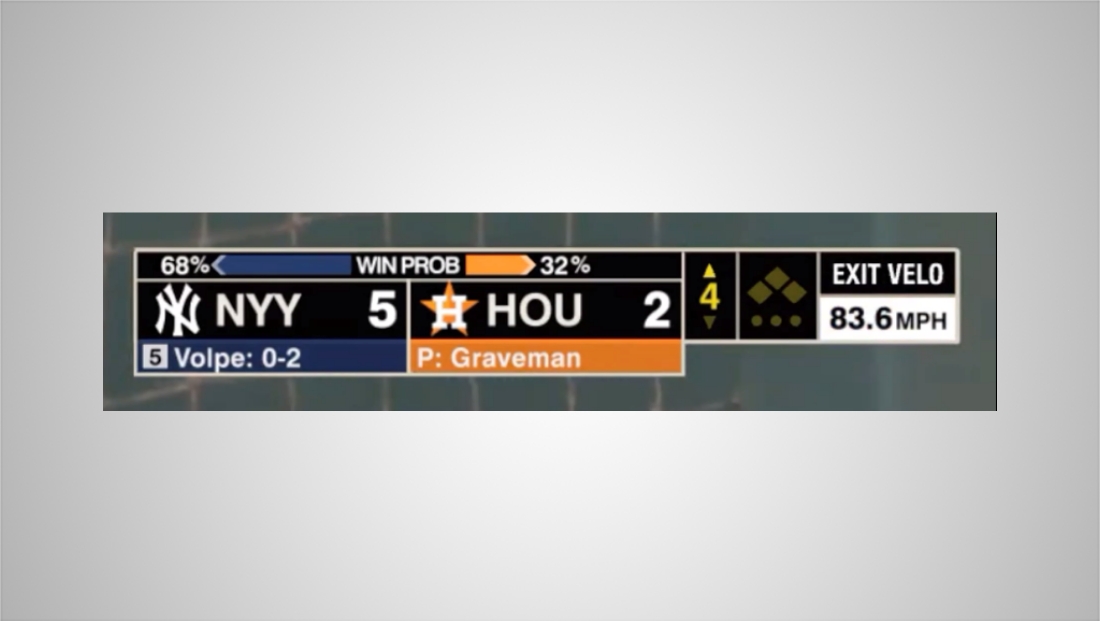ESPN brings win probability to MLB score bug, considering other data to integrate

Subscribe to NCS for the latest news, project case studies and product announcements in broadcast technology, creative design and engineering delivered to your inbox.
ESPN is introducing a new feature in its Major League Baseball broadcasts this season with the addition of win probability metrics to the in-game score box.
This update will be primarily showcased during ESPN’s “Sunday Night Baseball,” along with other special MLB broadcasts, including the Seoul Series, special Sunday games from Mexico City and London and playoff coverage.
Phil Orlins of ESPN highlighted in a media call that the network’s own analytics team will provide the win probability algorithms for MLB, utilizing a system not drastically different from existing models but tailored by ESPN’s in-house statistics and information group. The initiative is part of ESPN’s broader strategy to enhance viewer engagement by incorporating more analytical data into their broadcasts.
“One of the things that we’ll be doing this year for the first time, we will add win probability to our miniboard,” Orlins said. “It will be up there 100 percent of the time, or 98 percent of the time, during the telecast.”
Orlins also noted ESPN’s interest in exploring other analytical features, such as pitch selection probability graphics, which would inform viewers about the types of pitches a pitcher might throw in different counts, along with the development of scouting reports that blend both hitter and pitcher strengths and weaknesses.
In addition to the win probability metric, Orlins mentioned forthcoming technological advancements set to enhance the visual presentation of broadcasts, pointing to the collaboration with MLB in evolving graphic integrations.
The integration of analytical features such as win probability into ESPN’s MLB broadcasts marks a continued effort to provide viewers with a deeper understanding of the game’s dynamics.
This move also reflects the broader trend of incorporating sports betting-related metrics into sports broadcasts, acknowledging the growing interest in sports analytics among fans.
“People who obviously have a wager on the game maybe have a little more thought about it as well… We want to embrace the differentiation there,” said Orlins.
ESPN did experiment with similar data in 2017, displaying the probability only in “key moments” of the game.
“It will not probably at the outset be mostly positive reaction, but I think over time it will connect with the psyche and intentions of the viewers,” said Orlins, anticipating some initial resistance from viewers to these changes but expects acceptance to grow over time as fans become accustomed to the new features.
He emphasized the importance of creating an emotional connection with viewers, suggesting that these analytical enhancements will ultimately enrich the viewing experience by offering insights that go beyond traditional game coverage.
“People think about their team’s chances of winning all the time. That doesn’t necessarily mean they won’t have emotional thoughts when they see their team only has a four percent change to win or something like that, by mathematical equations. So I do expect some of that reaction.”
Subscribe to NCS for the latest news, project case studies and product announcements in broadcast technology, creative design and engineering delivered to your inbox.




tags
ESPN, MLB, mlb on espn, Sports Betting, Sunday Night Baseball
categories
Data Visualization, Graphics, Heroes, Sports Broadcasting & Production